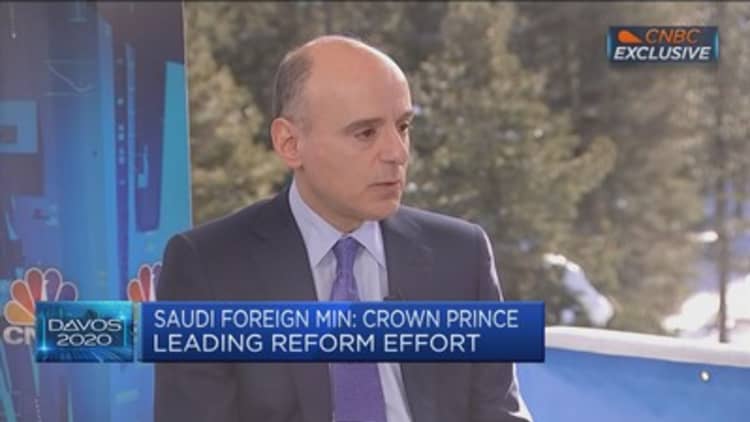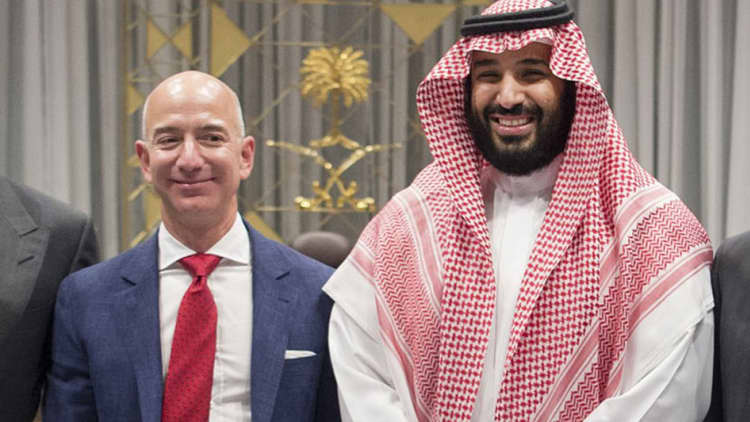Explosive allegations that tie Crown Prince Mohammed bin Salman to the hacking of Amazon CEO and billionaire Jeff Bezos' phone are "nonsense," Saudi Arabia's minister of state for foreign affairs said Thursday.
"Total nonsense — this story was out almost a year ago, it was debunked, we rejected it completely," Adel al-Jubeir told CNBC's Hadley Gamble at the World Economic Forum in Davos, Switzerland.
"It was based on false and unproven allegations, people trying to sensationalize something that is pure fiction."
The comments come in response to the release of a 2019 report based on forensic analysis by advisory firm FTI Consulting, which was hired by Bezos to investigate an apparent hack of his phone and the exfiltration of reams of personal data, including nude photos sent to a mistress.
Asked where he thought the allegations in the report originated, al-Jubeir replied, "You'll have to ask the people who wrote it. I can't read people's minds, but I do know it's a total fabrication, a total lie. Whoever is putting this out is trying to put Saudi Arabia in a bad light."

The Amazon CEO, one of the world's richest men, also owns The Washington Post. The newspaper became a target of Saudi internet attack campaigns in response to highly critical coverage of the kingdom after the murder of one of its columnists, Jamal Khashoggi, by Saudi operatives in October 2018.
Bezos, through his security consultant Gavin de Becker, has flatly accused the Saudi government of wanting to do him harm. De Becker alleged last March that the Saudis had "access to Bezos's phone, and gained private information" and that the government was "intent on harming Jeff Bezos since . . . the Post began its relentless coverage" of the brutal murder of Khashoggi.
U.N. experts on Wednesday called for an immediate investigation into the "possible involvement" of the Saudi crown prince in the cyberattack.
"The alleged hacking of Mr. Bezos's phone, and those of others, demands immediate investigation by U.S. and other relevant authorities, including investigation of the continuous, multi-year, direct and personal involvement of the Crown Prince in efforts to target perceived opponents," the U.N. special rapporteurs said in a statement.

The forensic report suggested the involvement of the crown prince in the surveillance of Bezos, which the U.N.'s rapporteurs described as "an effort to influence, if not silence, The Washington Post's reporting on Saudi Arabia." The U.N. itself did not contribute further investigation into the case at the time of the statement and did not make a conclusive claim that the crown prince was involved.
Indeed, FTI Consulting could not detail the specific spyware used in the attack, and admitted in its report that its cybersecurity researchers could not detect traces of malware. But it said its experts had "medium to high confidence" that Bezos' iPhone was hacked by malware coming from a WhatsApp account used by the Saudi crown prince due to the abnormally high volume of data extracted from the phone after it received a video file sent by Prince Mohamed's account.
The hack: How experts believe it happened
According to the 2019 forensic analysis by FTI Consulting, Bezos' phone was likely "infiltrated on 1 May 2018 via an MP4 video file sent from a WhatsApp account utilized personally by Mohammed bin Salman."
Bezos and the crown prince had reportedly exchanged numbers the previous month. Within hours of the video being sent from the crown prince's account, "massive and (for Bezos' phone) unprecedented exfiltration of data from the phone began" — the volume of data being transited to another location suddenly shot up by nearly 30,000% to 126 MB.
"Data spiking then continued undetected over some months and at rates as much as 106,032,045% (4.6 GB) higher than the pre-video data egress baseline for Mr. Bezos' phone of 430KB," the report said.
However, the investigation was limited by an apparent inability to adequately penetrate the video file itself.
"Due to end-to-end encryption employed by Whatsapp," the analysts wrote, "it is virtually impossible to decrypt the contents of the downloader to determine if it contained any malicious code in addition to the delivered video."
Wednesday's U.N. statement said that the alleged hacking of Bezos' phone was "consistent with the widely reported role of the crown prince in leading a campaign against dissidents and political opponents."
The accusations also carry echoes of a 2019 U.S. criminal case against two Twitter employees and a Saudi national who accessed private accounts of certain users critical of the Saudi royal family that they then shared with the kingdom's authorities.
While Prince Mohammed has spearheaded a sweeping social and economic reform agenda for the oil-rich kingdom, human rights groups criticize his simultaneous crackdown on activists and dissidents inside and outside Saudi Arabia, as evidenced by increased arrests and the reported overseas hacking campaigns.






